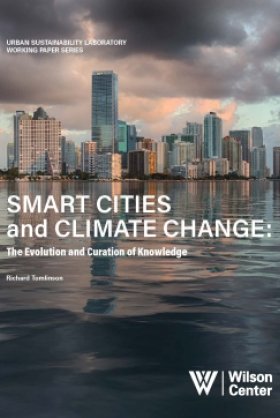Uncertainties and Inequalities: Post-communist transformation of Budapest
Following the collapse of communist systems in East Europe, cities and nations confronted the task of introducing markets and democratically accountable political systems. In other words, they needed to establish economic and governing mechanisms empowering individuals. They needed, as a popular metaphor of the time expressed the challenge, “to make an aquarium out of fish stew.”

Following the collapse of communist systems in East Europe, cities and nations confronted the task of introducing markets and democratically accountable political systems. In other words, they needed to establish economic and governing mechanisms empowering individuals. They needed, as a popular metaphor of the time expressed the challenge, “to make an aquarium out of fish stew.”
The challenges of the post-communist transformation appeared overwhelming and, in fact, the results were imperfect at best. Budapest, however, proved to be an exception. Presided over by former dissident turned mayor Gabor Demszky, the Hungarian capital came to represent a model of reform. Demszky and his team were so successful that he was re-elected five times and became the longest serving mayor of a major European capital by the time he retired from politics in 2010.
“In 1990 some incensed people started to destroy the communist monuments in Budapest because they didn’t want the specters of communism to continue to be present in their everyday lives,” said Gabor Demszky, Wilson Center fellow and former Mayor of Budapest, at a seminar hosted by the Wilson Center’s Urban Sustainability Laboratory on March 4, 2014. Demszky reflected on the challenges he and the city of Budapest faced during the 1990s after the collapse of communism in Hungary, comparing the difficult transition to the types of infrastructural trials city planners faced at the end of the 19th century.
Given that many projects around the city went unrealized or were left incomplete, Demszky’s remarks focused on two important questions that shaped his experience and the methods by which his administration confronted challenges and accomplished city goals: how do cities work through budgetary quandaries; and what policies could Budapest put into place to mitigate major social inequities.
According to Demszky, in the wake of the collapse of socialism, Budapest suffered from the “elimination of more price subsidies, the end of full employment, and the transformation of state owned enterprises into profit making entities.” In order to revitalize and build the city, Budapest required renewed development and reorganization of its policies. “During my tenure of 20 years, our main concern was to find feasible solutions to finance major projects while keeping the quality and accountability of the city at a good level,” Demszky stated. To facilitate intervention and policy change, support from the city’s wards and local governments, encompassing substantial geographical regions and diverse populations, was vital to influence social and financial change and redistributed policies. Demszky could not implement economic and social reforms without their backing, thereby adding political challenges to administrative and financial tasks.
Demszky and his administration sought to develop innovative and effective financial strategies and policies. “The main focus was not how to spend funds but how to save money,” he said. He understood that sustainable financial management was paramount to the success of Budapest. The Budapest Model Financial Strategy (BMFS) established long-term goals in the best interest of the city as a whole, despite the inclination of politicians to support plans with short-term benefits targeted for certain select groups. According to Demszky, this long-term strategy promoted better communication among the Budapest government, residents, and businesses. “To realize our neighborhood-based social revitalization program, an extremely strong cooperation was needed between the selected districts and the municipality of Budapest.” Demszky and his administration shared city project details with citizens and collaborated with residents to integrate sound urban development practices with plans to transform Budapest’s infrastructure.
As mayor, Demszky also needed to address ethnic and economic discrimination as well as inequalities that stemmed from the introduction of a market economy. Freed from state control, businesses dismissed many workers, singling out and escalating discrimination against ethnic minorities, the Roma in particular. Demszky stressed his work to eliminate segregation of the Roma and provide equity to Roma citizens in Budapest.
As a result of Demszky’s efforts to bring about urban, social, and economic change, Budapest’s credit rating increased, thus increasing financial options for city projects and development. “The financial management of the capital became a dependable instrument of urban policy. From the accumulation of the operational surplus, the city completed hundreds of projects,” Demszky said.
Anders Aslund, Senior Fellow at Peterson Institute and Adjunct Professor at Georgetown University offered an international perspective of Hungary’s current economic standing. Aslund stated that the government of Hungary revitalized the country with some measure of success during the 1990s, noting that Hungary is the only post-communist country that did not have a financial crisis. Aslund attributed most of Hungary’s success to the country’s ambitious post-communist transition of aggressively promoting privatization—more than any other democratized East European country at that time—which saved its urban, social, and economic infrastructure. While Hungary actively developed institutions and infrastructure in the beginning, a malaise took root in the latter part of the 2000s, according to Aslund. Though Hungary’s GDP grew by 20 percent, social welfare expenditures created lasting adverse effects on the economy. Currently, Hungarians are dissatisfied with the economic dilemma but they have yet to reach consensus on a solution, Aslund concluded.
Sonia Hirt, Associate Dean for Academic Affairs at the College of Architecture and Urban Studies, Virginia Tech, compared Hungary’s transition and urban management to U.S. cities and municipalities, stating that many of Hungary’s policies are relevant to American. She raised the question of expenditure prioritizations and asked Demszky how it was determined which projects in Budapest were worthy of state funds. Hirt addressed the difficulty of balancing physical capital against social capital. “These are questions that American municipalities face on a daily basis,” she said. In the United States, municipalities compete for funding and do not cooperate to share resources. Successful redistribution policies require a strong municipality; however this would be impossible in the United States where most municipalities are extremely fragmented and have an uneven quality of leadership, Hirt stated.

Urban Sustainability Laboratory
Since 1991, the Urban Sustainability Laboratory has advanced solutions to urban challenges—such as poverty, exclusion, insecurity, and environmental degradation—by promoting evidence-based research to support sustainable, equitable and peaceful cities. Read more

Global Europe Program
The Global Europe Program is focused on Europe’s capabilities, and how it engages on critical global issues. We investigate European approaches to critical global issues. We examine Europe’s relations with Russia and Eurasia, China and the Indo-Pacific, the Middle East and Africa. Our initiatives include “Ukraine in Europe” – an examination of what it will take to make Ukraine’s European future a reality. But we also examine the role of NATO, the European Union and the OSCE, Europe’s energy security, transatlantic trade disputes, and challenges to democracy. The Global Europe Program’s staff, scholars-in-residence, and Global Fellows participate in seminars, policy study groups, and international conferences to provide analytical recommendations to policy makers and the media. Read more











